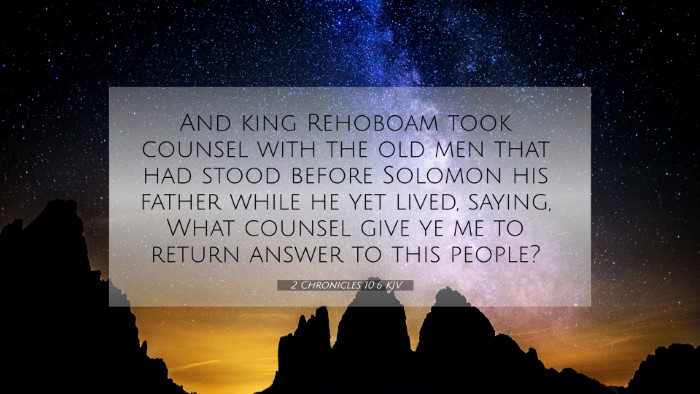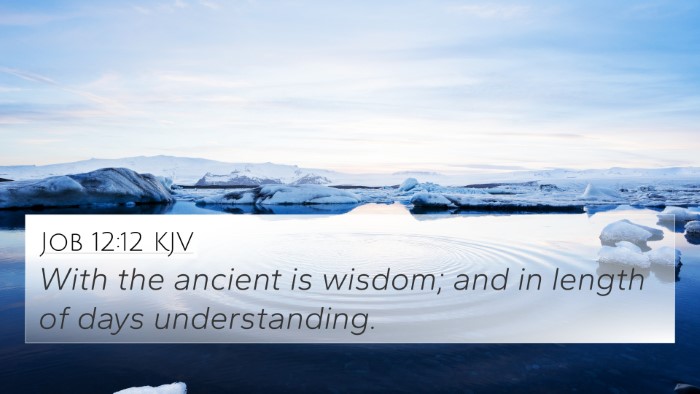Understanding 2 Chronicles 10:6
Verse Overview: 2 Chronicles 10:6 states:
"Then King Rehoboam consulted with the elders who stood before his father Solomon while he yet lived, saying, 'How do you advise me to answer this people?'"
Exegesis and Interpretation
This verse captures a pivotal moment in biblical history, as Rehoboam, the son of Solomon, seeks guidance from his advisors as he prepares to respond to the demands of the Israelites for lighter burdens. The verse illustrates the importance of seeking wise counsel and highlights the tension surrounding leadership choices.
Commentary Insights
Matthew Henry's Commentary
Matthew Henry emphasizes the significance of consulting experienced and wise counsel. He suggests that Rehoboam's choice to seek advice from the elders reflects his initial attempt to lead wisely. However, Henry also warns about the influence of poor advice, which Rehoboam later encounters.
Albert Barnes' Notes
Albert Barnes notes that the elders Rehoboam consulted had experienced Solomon's reign and understood the people's needs. Barnes stresses the necessity of humility in leadership, indicating that wise leaders seek out the counsel of those who have walked the path before them.
Adam Clarke's Commentary
Adam Clarke highlights the contrast between Rehoboam's decisions and those of his father, Solomon. Clarke interprets this consultation as a moment where Rehoboam has the potential to choose a path of wisdom or folly, showcasing the dynamics of power and leadership in Israel.
Critical Analysis
This verse not only contextualizes the immediate situation faced by Rehoboam but also reflects broader themes of authority, legacy, and decision-making in biblical leadership.
Connections Between Bible Verses
For a comprehensive understanding, it is beneficial to cross-reference this verse with others that provide context and additional insight:
- 1 Kings 12:6-7 - Provides a parallel account of Rehoboam's consultation with the elders.
- Proverbs 15:22 - "Without counsel, plans fail, but with many advisers, they succeed," emphasizing the value of wise counsel.
- 2 Chronicles 1:7-10 - Illustrates King Solomon’s wise request for wisdom during his reign, setting a precedent for leadership.
- Proverbs 11:14 - Connects to the need for guidance in leadership decisions.
- Exodus 18:21 - Jethro advises Moses to appoint capable leaders, similar to the advice sought by Rehoboam.
- James 1:5 - Speaks about asking God for wisdom, reflecting a spiritual dimension to seeking counsel.
- Matthew 12:25 - Highlights the principle that divided leadership cannot stand, echoing the potential consequences of poor leadership choices.
Thematic Connections
Examining this verse within its thematic framework reveals connections to leadership dynamics, the importance of wisdom, and the consequences of decisions made in authority. The potential parallels could lead to further discussions on:
- Leadership and Accountability - How leaders are called to be responsible for their decisions.
- Wisdom in Guidance - The importance of seeking wise counsel in personal and communal contexts.
- Historical Context - Understanding Israel's divided kingdom as a result of Rehoboam's choice.
Applying the Verse Today
In modern contexts, 2 Chronicles 10:6 serves as a reminder that even those in positions of power must seek advice and acknowledge the wisdom of those who have experience. It highlights the critical role of mentors and advisors across various fields.
Tools for Bible Cross-Referencing
For those studying this verse and its connections, various resources can enhance understanding:
- Bible Concordance: An essential tool for finding verses and themes related to 2 Chronicles 10:6.
- Bible Cross-Reference Guide: A structured method to link related scriptures.
- Bible Chain References: Following a chain of relevant verses can deepen insight into specific themes.
- Cross-Reference Bible Study: Engaging in studies that encourage cross-referencing can illuminate complex biblical themes.
Conclusion
2 Chronicles 10:6 serves not only as an individual verse but as a linchpin connecting numerous scriptural themes and narratives about leadership, wisdom, and the dynamics of seeking counsel. By examining these cross-references, one can gain a fuller understanding of the implications of Rehoboam's actions and the overarching biblical principles they represent.












